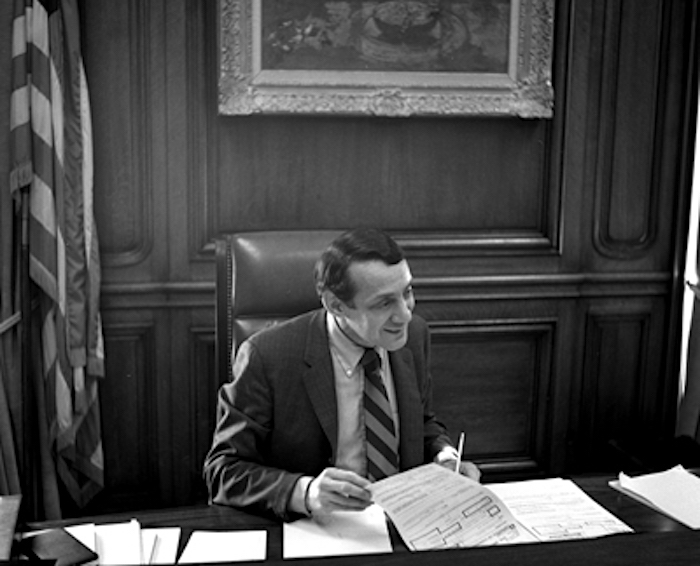
The assassinations of Harvey Milk and George Moscone were a terrible human tragedy. The murder of the first openly gay elected official in the United States stunned the emerging LGBT movement, and the impact is still felt 40 years later.

Milk, former Assemblymember Tom Ammiano told me, “was like Alexandria Ocasio-Cortez in that he was aspirational. He didn’t pay politics the way the others played.” He was also, early on, someone who understood what we now call intersectional politics. “He connected the dots,” Ammiano said.
He was, Ammiano said, part of the “gay left – and San Francisco owes a lot to the gay left.”
He was also part of a progressive, neighborhood, community-based movement that was rapidly emerging in the city. “He was a leader who took the lead from his constituency,” Ammiano said. Among other things, he introduced the city’s first anti-speculation law to curb rent increases.

Harvey Milk as Mayor for a Day
March 7, 1978, when Moscone was out of town.
Moscone was a mayor who ran with the support of those same progressive movements. He, like Milk, was a big supporter of the successful move to shift from at-large elections of supervisors to district elections – which in 1977 brought Milk into office.
District elections were the centerpiece of the emerging progressive agenda, a way to give the neighborhoods more power over downtown, to cut the role of big money in politics, and to diversify the board. The Chamber and its allies, including Sup. Dianne Feinstein, hated district elections and were constantly trying to find ways to get rid of the system.
The murders changed the politics of the city, dramatically.
Moscone was replaced with Feinstein, who was a friend to big business and developers. And Feinstein and the Chamber of Commerce cynically and brutally used the murders (following in the wake of the Jonestown massacre) as a wedge to get rid of district elections.
Help us save local journalism!
Every tax-deductible donation helps us grow to cover the issues that mean the most to our community. Become a 48 Hills Hero and support the only daily progressive news source in the Bay Area.
“The political arc of the city was going in one direction,” activist Calvin Welch remembered. “And then it went in a very different direction.”
Within days after Dan White shot Moscone and Milk, the Chamber and its allies were plotting ways to use the tragedies as a political tool. “The drumbeat started almost immediately,” Welch said.
The message the Chamber put out: Dan White was so unbalanced that he never would have been a supervisor without district elections. Jim Jones was part of the new Moscone coalition. So the progressive agenda brought nothing to the city but chaos and disaster.
The reality: Jones had a constituency, and ran a church where white and Black people worshipped together, which was radical at the time, so politicians had to deal with him – but he was never part of any grassroots coalition. He was far from Moscone’s inner circle.
And Dan White didn’t seem unbalanced when the Chamber (and Feinstein) worked with him on legislation – and begged him not to give up his seat. Yes, the same people who later said White represented everything wrong with district elections were the ones who pushed hard to get Moscone to reappoint him after he resigned.
But no matter: Feinstein was elected to a full term in 1979, and just a few months later the Chamber began working with her to craft a special-election measure for the August, 1980 ballot that would repeal district elections.
It worked. Mailers sent out for the Yes on A (repeal) side talked about White and the murders. In a single-issue, low-turnout, summer election, the voters returned the city to an at-large system – which guaranteed that downtown and the developers would be in control again.
That lasted 20 years. Immense damage was done to the city and the progressive movement was reeling. Not until 1999 did the voters realize that they would be better served by returning to the district system for the 2000 elections.
Moscone was able to bring together the old-school liberal wing of the local Democratic Party – and the more progressive community-based movements that were arising across the city. “And after the murders, we lost liberal San Francisco,” Welch said.
When White went on trial, the Bay Guardian argued that DA Joe Freitas bungled the case: He portrayed the killings as murders, which allowed White’s lawyers to use the notorious Twinkie Defense. The trial, the paper said, should have been about a pair of political assassinations carried out with the intent to alter the direction of local government.
The cynicism of the Chamber using the murders to overturn a system that both Moscone and Milk worked hard to create and to undermine the movements that they devoted their lives to building is stunning, even 40 years later. “The only think I could think of,” Welch said, “is that they were rolling over in their graves.”
